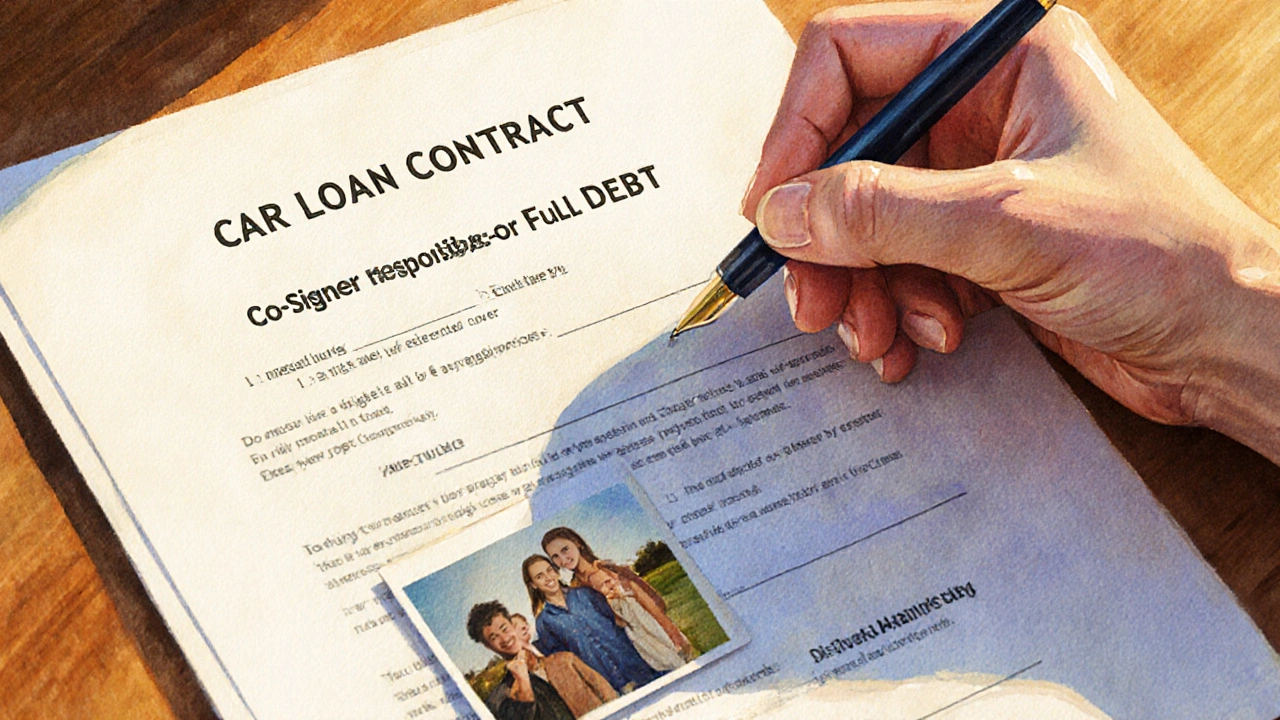Buying a car with a co-signer can feel like a lifeline-especially if you’re young, new to credit, or have a thin credit history. But it’s not just about getting approved. A co-signer isn’t just a name on a form. They’re putting their own money, credit score, and financial future on the line. And if things go wrong, the fallout isn’t just inconvenient-it can be devastating.
What Exactly Is a Co-Signer?
A co-signer is someone who agrees to repay your car loan if you can’t. They’re not just helping you get the car-they’re legally responsible for the full debt. This means the lender sees their income, credit score, and payment history as just as important as yours. In fact, many lenders will approve the loan based almost entirely on the co-signer’s qualifications.
Co-signers are often parents, spouses, or close relatives. But it’s not always family. Sometimes it’s a friend or mentor with strong credit. Either way, the arrangement is binding. Once they sign, they’re locked in until the loan is paid off or refinanced.
Why People Use a Co-Signer for Car Loans
Most people turn to a co-signer because they can’t qualify on their own. Maybe they’ve never had a credit card. Maybe they had a bankruptcy five years ago. Or maybe their income is too low to meet the lender’s debt-to-income ratio.
Without a co-signer, these buyers might face:
- Loan denial outright
- Extremely high interest rates (15% or more)
- Large down payments (20-30%)
- Shorter loan terms that make monthly payments unmanageable
With a co-signer, the same buyer might get a 5.9% APR, a 60-month term, and only need a 5% down payment. That’s the difference between a car you can afford and one that eats up your paycheck.
The Real Benefits of Having a Co-Signer
Yes, getting approved is the big win. But there’s more.
Lower interest rates mean you pay thousands less over the life of the loan. For a £20,000 car at 6% over 5 years, you’d pay £3,135 in interest. At 12%, you’d pay £6,628-over £3,500 more. That’s a used Honda Civic you could have bought outright.
Better loan terms give you breathing room. A longer term lowers monthly payments. That helps you manage rent, groceries, and insurance without constant stress.
Building credit is another hidden benefit. If you make every payment on time, your credit score will climb. After 12-18 months of good payments, you might be able to refinance the loan in your name alone-freeing your co-signer from responsibility.

The Hidden Risks No One Tells You About
Here’s the part most people skip: what happens when you miss a payment?
The lender doesn’t care if you lost your job, had a medical emergency, or just forgot. They call the co-signer. That payment shows up on their credit report. Late payments, defaults, repossession-it all sticks to them like glue.
One real case from Bristol: a 22-year-old student missed three payments after his internship ended. His mother, who co-signed, got a call from the lender. She had no idea he’d fallen behind. By the time she found out, her credit score had dropped 110 points. She couldn’t get a mortgage for her new home.
And it’s not just credit. If the car is repossessed, the co-signer still owes the remaining balance-even if the car sold for £5,000 and the loan balance was £12,000. That’s a £7,000 debt they didn’t even drive.
Co-signing can also strain relationships. If you’re late on payments, your co-signer might start nagging, threatening, or even taking your keys. That’s not just financial-it’s emotional.
Who Should Never Co-Sign
Not everyone should do this. Here’s who should say no:
- Someone nearing retirement-your loan could delay their plans
- Someone with high existing debt-they might not qualify for future loans
- Someone with poor mental health or financial anxiety-this stress can be overwhelming
- Anyone who doesn’t fully understand the legal responsibility
Even if someone says yes, they need to know the full picture. Many co-signers think, “I’ll just help them get started.” They don’t realize they’re signing a contract that could follow them for five years.
How to Protect Yourself as a Co-Signer
If you’re the one co-signing, here’s how to reduce your risk:
- Only co-sign if you can afford to pay the full loan yourself. What if your car breaks down and you lose your job? Can you still make these payments?
- Ask for payment notifications. Some lenders let co-signers sign up for alerts when payments are late or missed.
- Set up automatic payments from your account-not theirs. That way, you control the timing and avoid surprises.
- Get a written agreement with the borrower. Even if it’s informal, outline who pays for insurance, maintenance, and what happens if they can’t pay.
- Request a co-signer release clause. Some lenders allow the borrower to remove the co-signer after 12-24 on-time payments. Get it in writing before you sign.

How to Be Responsible as the Borrower
If you’re the one borrowing with a co-signer, you owe them more than just payments. You owe them respect.
- Make every payment on time-no exceptions. Set up reminders, auto-pay, or calendar alerts.
- Keep them updated. If you’re struggling, tell them before the payment is due. They’ll appreciate the honesty.
- Don’t use the car as an excuse to overspend. That £20,000 car might be nice, but it’s not worth damaging your relationship.
- Plan to refinance. Start saving early. Aim to build your credit enough to qualify on your own within 18 months.
- Thank them. Seriously. A card, a dinner, a small gift-it matters.
Alternatives to Co-Signing
Co-signing isn’t the only path. Consider these options:
- Buy a used car with cash or a small loan. A £6,000 used Ford Fiesta is easier to manage than a £25,000 new model.
- Use a credit union. They often have more flexible terms for first-time buyers and may offer small starter loans.
- Get a secured credit card and build credit for 6-12 months before applying.
- Ask a family member to gift you a down payment. That reduces the loan amount and may eliminate the need for a co-signer.
- Wait and save. If you can wait 6-12 months, you might qualify on your own with a better rate.
Final Thought: It’s a Partnership, Not a Favor
Co-signing a car loan isn’t a gift. It’s a financial partnership. It requires trust, communication, and clear boundaries. Done right, it can help someone get on their feet. Done wrong, it can break relationships and ruin credit scores.
If you’re thinking about co-signing, ask yourself: Would I be okay if I had to pay this loan in full tomorrow? If the answer isn’t a hard yes, don’t do it.
If you’re borrowing with a co-signer, remember: their credit is on the line because they believe in you. Don’t make them regret it.
Can a co-signer be removed from a car loan?
Yes, but only if the lender offers a co-signer release option. This usually requires 12 to 24 consecutive on-time payments and proof that the borrower can qualify on their own. Not all lenders offer this, so check your loan agreement before signing. If your lender doesn’t allow releases, the only way to remove a co-signer is to refinance the loan in your name alone.
Does co-signing a car loan affect the co-signer’s credit score?
Yes. The loan appears on the co-signer’s credit report just like it does on the borrower’s. If payments are late or missed, it hurts their score. Even if payments are on time, the loan increases their debt-to-income ratio, which can make it harder to get approved for a mortgage or other loans. The loan stays on their report until it’s paid off or refinanced.
Can a co-signer take ownership of the car?
No. The person whose name is on the car title is the legal owner. The co-signer has no ownership rights, even if they’re paying the loan. They’re only responsible for repayment. If the borrower defaults, the lender can repossess the car, but the co-signer can’t legally take it. To gain ownership, the co-signer would need to buy the car from the borrower or refinance the loan in their own name.
What happens if the borrower dies?
The co-signer becomes fully responsible for the remaining loan balance. The car may be part of the borrower’s estate, but if the estate can’t pay the loan, the lender will pursue the co-signer. Life insurance or a co-signer protection policy can help cover this risk, but most lenders don’t require it. It’s something to discuss before signing.
Is it better to co-sign or give a down payment gift?
It depends. Giving a down payment reduces the loan amount and may eliminate the need for a co-signer. This avoids the credit risk for the giver. But if the borrower still can’t qualify on their own, a down payment alone won’t help. Co-signing helps with approval and interest rates, but carries ongoing risk. A gift is safer for the giver; co-signing is more helpful for the borrower’s long-term credit building.


Comments
TIARA SUKMA UTAMA
My mom co-signed for me and I paid it off in 14 months. She never said a word. Just sent me a text: 'You did good.' That’s all I needed.
November 4, 2025 at 02:39
Jasmine Oey
OMG I can’t believe people still do this?? Like, why are you letting your 19-year-old get a $30k car?? That’s not helping them, that’s enabling a Netflix and chill lifestyle with leather seats. My cousin got a 2010 Civic for $4k and still has it. She’s now a dentist. Coincidence? I think not.
November 4, 2025 at 05:58
Marissa Martin
I know someone who co-signed for their nephew. He missed payments. She got a call at 2 a.m. Her credit dropped. She couldn’t get a loan for her own home. She still talks about it like it was a betrayal. But she never asked him to make a budget. Maybe she should’ve said no from the start.
November 6, 2025 at 01:28
James Winter
Canada doesn’t even let you co-sign like this. We have better systems. Why are Americans still doing this? You’re just creating debt slaves. Get a job. Save. Buy a beater. That’s how it’s done.
November 7, 2025 at 11:39
Aimee Quenneville
So… you’re saying if I co-sign, I’m basically signing a ‘I hate my future self’ contract?? 😅 Also, why does everyone assume the borrower is lazy? What if they’re working two jobs and still can’t qualify? Just saying.
November 9, 2025 at 08:11
Cynthia Lamont
STOP. STOP. STOP. You said ‘£20,000’ and then ‘$3,500’ in the same paragraph. That’s not a typo. That’s incompetence. And you’re telling people to ‘thank their co-signer’ like it’s a Hallmark movie? This isn’t a parenting blog. It’s a financial contract. Get your currency straight before you give advice.
November 10, 2025 at 03:43
Kirk Doherty
My dad co-signed. I paid on time. He never mentioned it. I paid it off. We never talked about it again. That’s how it should be.
November 10, 2025 at 10:56
Dmitriy Fedoseff
Co-signing is a mirror. It doesn’t reveal who needs help-it reveals who believes in responsibility. The real question isn’t ‘can they pay?’ It’s ‘do they deserve the trust?’ That’s not financial. That’s moral. And we’ve forgotten how to ask it.
November 11, 2025 at 11:55
Meghan O'Connor
‘Plan to refinance in 18 months’-yeah right. Most people can’t even budget for gas. This whole post is naive. You think people read the fine print? They don’t. They just want the keys. And then they blame the co-signer when things go south.
November 11, 2025 at 23:09
Morgan ODonnell
I co-signed for my sister. She paid every month. We didn’t even talk about it. She sent me a coffee gift card when she refinanced. That was enough. No drama. Just quiet responsibility.
November 13, 2025 at 14:51
Liam Hesmondhalgh
Why are we even having this conversation? If you can’t get a loan without someone else’s credit, you shouldn’t be driving. Get a bike. Take the bus. Or work more. Simple. No co-signing. No drama. Just life.
November 14, 2025 at 12:43